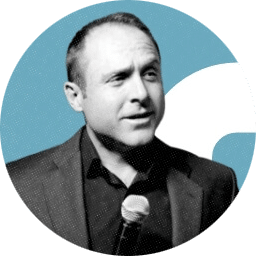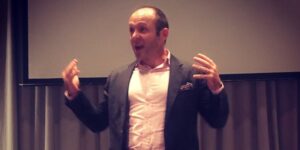In this episode, Jonathan dives deep into the impact of Abigail Shrier’s book ‘Bad Therapy’ on education and mental health. Despite facing a recent accident, Jonathan shares insights on the importance of community and relationships in combating neuroticism. Join him as he explores the role of Catholic education in nurturing communal bonds and serving others to foster mental well-being. Discover the power of breaking free from the ‘autonomous self’ and embracing a culture of connection. Tune in for actionable strategies and thoughtful reflections
Welcome Aboard
Hello there, my friend, Jonathan Doyle, with you once again. Welcome to the Catholic Teacher Daily Podcast. It has been a huge week. I hope you’re still with me. Today’s and this week’s episodes have been really intense, with a lot of content. I’ve been reading Abigail Shrier‘s new book, Bad Therapy. If you haven’t heard any of the other episodes of this week, go check them out. There’s a lot of depth in there. And go check out that book, Bad Therapy. It’s got some really interesting stuff to say. If you care about young people and if you’re interested in education, which I know you are, there’s a lot in that. Maybe you’re a walker or a jogger and you can get the audible version, but definitely worth checking out.
Personal Reflections on Recovery and Thankfulness

Thank you for your many prayers. I had a really bad accident seven days ago, I had a bad crash on a training ride. And I broke 12 ribs, I shattered my shoulder and broke my collarbone. I totally displaced my collarbone. When they showed me the x-ray. I was like, ‘I don’t think that should be there.’ And they’re like, ‘No, we don’t think it should either.’ I remember the trauma surgeon coming up to me, and she said, ‘Normally, if the break is around two centimeters, we’ll leave it.’ She says yours is over five centimeters displaced and we’re going to do something about that.
There you go, it was a hospital stay and a bunch of surgeries. I have a whole bunch of metal in there now. Many of you remember I had a worse accident in 2019. I got titanium for both arms, and now I’ve got a bunch of steel in my shoulders, I’m like a man of steel. But thank you for your prayers. It’s been really beautiful, especially on Instagram. If you use Instagram, you can find me at @jdoylespeaks. A lot of people just sent some really beautiful messages there, which have been lovely, but I am grateful to God.
I’ve just been overwhelmed with gratitude. I’m grateful for the surgeons, for our family, for so many friends around the world who have reached out. I’m grateful to live in a country where we’re blessed with this level of health care. And I’m grateful for the great nurses and doctors, and I say this really carefully, but I’m really grateful for opium-based pain medication. I’ve got to get off in the next few days.
The Influence of Culture on Mental Health

his great book, Bad Therapy, has given you a whole bunch of different quotes this week. We’ve heard from one of the world’s preeminent academic professors in the realm of analysts and emotions. We’ve heard from Abigail Shrier a couple of times. I wanted to finish this little batch of episodes with a quote from Jordan Peterson. Many of you are familiar with him, but Abigail Shrier interviewed him and did a long interview with him about adolescent mental health. One of the quotes that he made is this: And he said,
“By making our children obsessively focused on their autonomous selves, all we do is pull them out of their social context, isolate them and make them neurotic.”
Jordan Peterson Tweet
All right, if you haven’t heard the previous episodes, this’ll be similar to lab strikes, but I guess throughout the week I have been talking about the mental health therapeutic model, which has taken schools around the world by storm. The constant focus on child and adolescent mental health and wellbeing. I’ve raised the contentious point that, given the vast amount of resources we’re throwing at this, why are we seeing the data get worse.
Challenges in Mental Health Education

One answer would be that all that’s happening is more, and kids are coming into the system because they’re realizing that they’re struggling with stuff. Possibly, but I’d be interested in things like social contagion. I’d be interested in things like if you create a culture where everything is pathologized and emotions become absolutely preeminent. You mainstream ideas of mental health and wellbeing, concepts of happiness. I wonder if that just creates to some degree, that’s what you’re trying to avoid. I don’t know what you think about that. It’s controversial.
Controversial Perspectives on Therapeutic Industry

Usually, what I find if I am really honest about it, the ones that scream the loudest are the ones most heavily invested in the system continuing exactly as it is. I just think, I’ve said this to people, if you look at Big Pharma, it is a blight on Western civilization, but it’s not an industry that exists to make people better. It’s definitely not that. Big Pharma exists to keep people sick because the entire business model depends on people not getting well. And it depends on more people entering the vortex that requires big farmers’ intervention, that’s the business model.
If it were genuinely a business that wanted people to get well, you’d see more and more people getting well. The market would probably shrink. I wonder if the therapeutic industry is a little bit like the little brother of Big Pharma. I don’t know if you think that’s intolerable language. I’d be curious to see what you think.
Expansion of the Therapeutic Industry
I’m not saying that there is no place for great Christian counseling and great pastoral care. I’m just curious because it’s creating a vast new number of jobs. It’s creating a large industry in terms of child and adolescent mental health and wellbeing.
I guess people could say, ‘Look, it’s only because the culture we’re living in is creating so many more problems.’ I think that’s part of the answer and I think that is partially true. And I think definitely if you create an utterly godless culture where people are completely unmoored from their ontological essence. You could; you’re going to see more pathology. But I’m just interested that no one’s having the conversation. We just assume that the path we’re on is either, it’s deterministic; it can’t be any other way. Or whether with perpetuating in any way.
Perspective on Autonomous Self and Social Context

What Jordan Peterson is saying here is that if we get children to be obsessed with their autonomous cells, which means that they come to interface with reality through the lens of nothing, but I, my rights, my happiness, and my feeling states. That the system exists to prop up my sense of the autonomous self. I can’t recommend it highly enough. Carl Trueman‘s Rise and Triumph for the Modern Self, that book had a huge impact on me.
But then Jordan Peterson goes on to say that if we train them to be relentlessly focused on their internal world and their autonomous self. We take them out of their social context, isolate them, and make them even more neurotic. So the social contact piece is important because we are unspeakably social beings. We are utterly optimized for connection and collaboration.
Impact of Atomistic Culture on Social Connections
I mentioned earlier in the week that as we have broken family systems down, we’ve become a very atomistic culture. So people move away. There’s a breakdown in connection with grandparents, cousins, nieces, and nephews. Not for everybody. I know some of you would still have really strong connections, but the data and the trend are pretty clear. So we tell kids to be focused on themselves. We break down this social context a bit through a culture that idolizes economic progress at the expense of everything else.
Economic Policy and Its Disconnect from Human Needs

And on that, I had a really interesting interview from the Senate the other day, where a politician was in a Senate hearing with people from the Treasury Department. It was quite profound because the Treasury Department had done all this modeling, and the modeling was entirely based on the economic benefit to the government. As this politician is saying, this forces people to have to work more and work longer, pay more in taxes. He was basically saying we’re not just homo economicus. What about families? This is going to take parents away from their kids more. They’re going to have to work longer hours. And the Treasury people were like, looking at this senator, like he was from another planet.
I know you can say, ‘Look, they’re from the treasury, it’s their job to do that.’ But I think the point he was making was that this policy was being made in the complete absence of any awareness of other human criteria. The economy doesn’t exist to serve itself. It exists to serve the human person and the polis.
Repercussions of Isolation and Neuroticism
We’ve got a culture where people and social context have been deeply impacted by this relentless push for growth. And so, to join this together, what he’s saying is that if we train kids to focus on themselves, we isolate them. We break down this social context, is it a surprise that they are going to become more neurotic?
Neuroticism is interesting because it simply means a kind of strong drive towards control. Which would explain a huge part of the explosion and anxiety because if you’re feeling more isolated, the drive, the psychological drivers for control and certainty. And if you can’t get control and certainty, then your anxiety levels go through the roof.
The Catholic Response to Mental Health

What is the Catholic response? What is the response to Catholic education? So what I want to offer you is just to put you back on your radar a couple of basic things in Latin, we would talk about communio personarum. So really simply let’s do Trinitarian anthropology 101. In Genesis 1:31, we are made in the image and likeness of God. Which means we are made in the image and likeness of the Trinity, which means we are made in the image and likeness of the communio personarum, which means we are made for relationships. We are made for relationships. It is non-negotiable.
If you know anything about the hermetic tradition, like the desert fathers, a Palestine that doesn’t have mothers. Yes, they lived in isolated caves. But what people don’t often know is that they will see each other a lot. They would actually visit each other a lot. There was this movement between solitude and community. The church has understood from its inception that we are an incredibly social species. And we’re like that because we carry the divine Imago, the Imago Dei. We carry the imprint of God.
Building a Community of Service in Schools
So I would encourage you to think deeply about any ways in which your classroom or your school community can build a community of some form to go deeper into community. And to force students into service. The more you can get students focused on serving other people, the better you are going to help their mental health. It is a no-brainer. The more you can do to get them out of themselves and serve people, the better.
Fostering Contribution in Family Life
One of the battles Karen and I fight as parents—we have three teenagers—is that I’m constantly giving them the opportunity to contribute to the life of the home. Why? Because it’s a community, it’s a community of people, and we want them to learn that they need to contribute to their community. They need to serve people. We do it, not just because we’re always tired and we don’t want to have to do everything, but because we know that it helps our mental health. It’s important.
Creating Opportunities for Service

So one of the beautiful things your Catholic school can do is create opportunities to serve. Help your students serve people—the elderly, the hungry, the homeless, the immigrant, whatever. But we have to break them out of this autonomous self. Why? We are not created to be autonomous cells. We were not created for that. And if we live that way, we will suffer. We’re created for relationships.
Going through this accident and being in so much pain, like the care and the gentleness. I said to Karen the day I got out of the hospital we had to go and get a bunch of medication for me. I look at myself over the last few days after the injury. I’ve just had so much care; people have brought food. People have rung me, texted me, and DMed me on Instagram. Rung me. Just follow it up. Karen’s taken amazing care of me. My kids, my daughters, and particularly my sons like that, ‘You alive.’ My daughter’s like. ‘Do you need anything?’ My youngest daughter, in particular, says that so many times I’m like please you have to stop asking.
Re-embedding Youth in Community
I’ve thought, imagine, I said this to Karen so many people, like us, have a pretty big drug problem in our city and a homelessness problem. So many people coming out of that hospital, they are discharged, and God only knows what they’re going back to. Are they going back to gentleness, are they going back to support?
I just think because we’re not autonomous cells, we’re made for community and relationships. I wonder if one of the ways out of this prison of mental health and wellbeing outcomes for young people will be re-embedding them in the community, particularly the community of faith.
The Church as a Motherly Figure

John of the Cross used to say that the Catholic Church is the great mother who keeps the children together on the journey. I had a Christian comedian joke about this once, he was, if you see moms and dads in airports, the dad will be like carrying stuff, but just thinking about why the gate is that oblivious to everything else. And the kids could just go; the five-year-old could go and order a beer in the bar, and the dad wouldn’t even notice, but moms always like keeping all the little kids together, and they know where every kid goes and where they’re at.
See, the church, John of the Cross said, the mother that keeps the children together on the journey. The church is the mother of our community. There’s no autonomous Christian. So praying together helps us students pray together to pray for each other. There are so many things you can do in a Catholic school to build, to break people out of prison of the autonomous self.
Practical Steps for Community Building

All right. I hope that’s helpful. Hope you are still listening. Please make sure you subscribe, which makes a big difference. If you’re listening on Apple Podcasts or Spotify, if you were to leave a review, that can be a real blessing to me. So please consider just jumping on your podcast app or your laptop, whatever, and just leaving a review. Look everything else is on the website: jonathandoyle.co.
I’m going to be back speaking in the USA. So you can book me to speak in the States. I love your country. I just love going over there and after I feel I was kidnapped at birth, I always feel like I’m coming home when I go to the States. So I think I’m going to be there in August. Reach out if you’d like me to come and speak, or anywhere in other parts of the world; I’d love to come visit.
And also check out Catholic consulting services which is the consultancy that I run, working with large Catholic organizations all around the world on perplexing problems at this moment in history.
Closing Remarks
God bless you. My friends, my name is Jonathan Doyle. This has been the Catholic Teacher Daily Podcast. You and I are going to talk again tomorrow.









